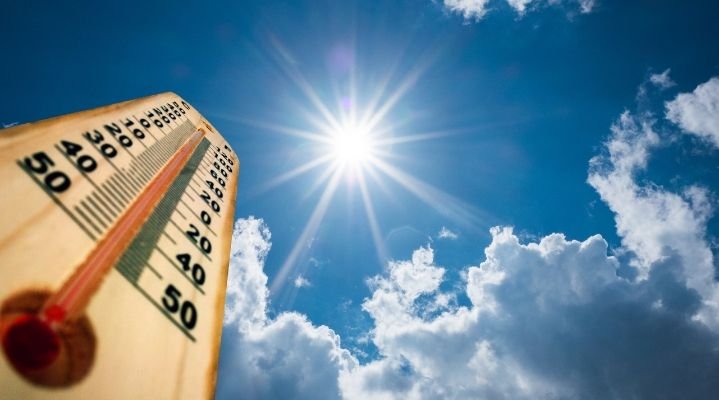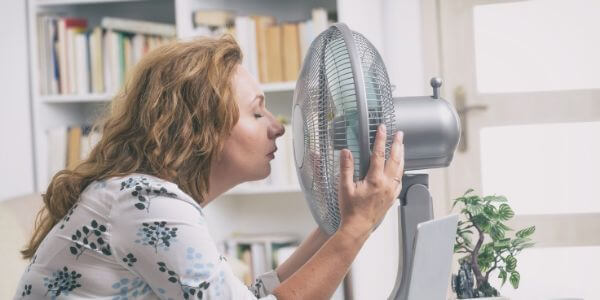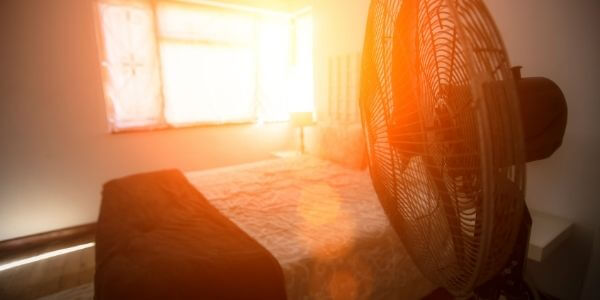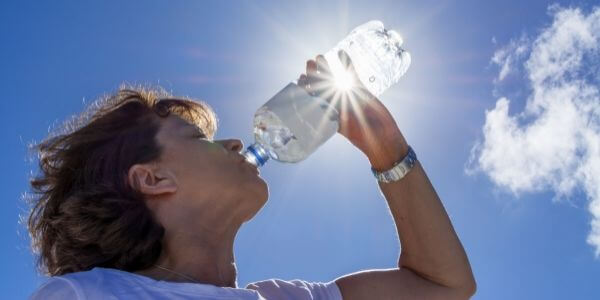UK 2019 heatwave: hot weather tips to remember as we get older

For most people, a splash of sun means trips to the beach, barbecues, and sunburn. But rising temperatures can pose a more serious risk as we get older.
Dr Ian Cole has extensive experience in looking after patients through periods of unusually high temperatures. In this article, he outlines the reasons why heatwaves can become a greater risk as we age, which symptoms are signs of a heat-related illness, and shares tips on how to stay cool and safe during the current rising temperatures.
Why are we more susceptible to heat as we get older?
The way our bodies react to heat changes as we age. For instance, blood circulation helps to transport heat from within our bodies to the surface of the skin, where it can radiate away, but we are more prone to poor circulation as we age. And we will sweat less than we did when we were younger, making it even harder for the body to lose heat.
We’re also more likely to be affected by conditions that require long-term prescription medicines. Unfortunately, a number of these medicines interfere with the body’s ability to regulate its own temperature.
- Antihistamines and anticholinergics help to treat allergies, sinus problems, and coughs and colds, but they also reduce the body’s ability to sweat and cool itself.
- Antipsychotic medications affect a part of the brain that controls the body’s ability to regulate its temperature.
- Medications like beta-blockers and calcium channel blockers help to slow the heartbeat and reduce blood pressure, but they also slow the flow of blood to the skin. This makes it harder for the body to release heat.
- Amphetamines and ephedrine are stimulants that increase internal body temperature and constrict blood vessels, making it harder for the body to release heat through the skin.
It’s worth noting that it’s important to continue taking prescription medication. If you or anyone in your care has any concerns, continue with the medication and speak to a physician.
Due to these factors, a heatwave can pose a serious risk as we get older.

What are the health risks associated with a heatwave?
The primary risks associated with a heatwave are dehydration, heat exhaustion, heatstroke.
Continued dehydration can require hospitalisation, and even lead to death if untreated. People suffering from heat exhaustion are rarely in any great danger as long as steps are taken to cool them down. If action isn’t taken, heat exhaustion can develop into heatstroke, which can be fatal.
What is dehydration?
Dehydration occurs when the body isn’t getting enough water compared to the amount of water it loses to sweat, urination, etc. Everyone will suffer mild and temporary dehydration in their lives, but they will suffer no lasting ill-effects. Dehydration is only dangerous when a person consistently doesn’t get enough water. Unfortunately, this is more likely as we get older.
Dehydration can cause:
- Low blood pressure
- Weakness
- Dizziness
- Increased risk of falls
- Urinary Tract Infections (UTIs)
- Skin conditions
- Pressure sores
Why are we at greater risk of dehydration as we get older?
We are more likely to suffer from long-term health problems that contribute to dehydration, such as diabetes, for instance. If there are high levels of glucose in the bloodstream, the kidneys will try to get rid of the glucose by creating more urine, reducing the water levels in the body.
Mobility issues become common as we age, which can make it difficult for us to get a drink when we need it.
And memory problems, perhaps as a result of dementia, mean it’s easy to forget to drink enough. This problem is made worse by the fact that the part of the brain that recognises when you’re thirsty doesn’t always work properly.
This means we need to be careful in watching for signs of dehydration, especially in hot weather.
What are the symptoms of dehydration?
The symptoms of dehydration include:
- Feeling thirsty
- Skin is less elastic and more fragile (takes longer to return to normal when pinched)
- Dark urine that has a strong smell
- Constipation
- Dizziness or lightheadedness
- Tiredness
- A dry mouth, lips and sunken eyes
- Not urinating as much
How to prevent dehydration
The best way to avoid dehydration is to drink regularly. Water is best. Juices and smoothies contain a lot of sugar, so they won’t hydrate you as well as other drinks. It’s best to avoid alcohol if you’re worried about dehydration.
If you’re living with or caring for someone and you’re worried about their hydration, try the following tips to keep them hydrated:
- Make sure they always have a drink within easy reach
- Make sure they have a drink with every meal
- Make an event of having a drink e.g. “let’s have a cup of tea”
- Give them food with a high water content, such as soups, fruits and vegetables, or jelly
In addition to causing some of the conditions listed above, dehydration can also contribute to another heat-related illness: heat exhaustion.
What is heat exhaustion?
Heat exhaustion is fatigue caused by exposure to excessive heat, or to heat we’re not used to. Heat exhaustion can sometimes lead to collapse or fainting, and left untreated it can progress to heatstroke, which is very dangerous. That’s why it’s important to take steps to cool a person down when they are suffering from heat exhaustion.
What are the symptoms of heat exhaustion?
The symptoms of heat exhaustion include:
- A headache
- Dizziness and confusion
- Feeling very thirsty
- A loss of appetite
- Feeling sick
- Sweating, and pale, clammy skin
- Cramps in the arms, legs and stomach
- Rapid breathing
- Rapid pulse
- A temperature of 38C or above
What is heatstroke?
Heatstroke is a serious condition caused by the body’s failure to regulate its temperature after being exposed to excessive heat, or heat it isn’t used to. Heatstroke can result in death, and should be treated as a medical emergency.

What are the symptoms of heatstroke?
You should call 999 if anyone exhibits the following symptoms:
- Doesn’t feel better 30 minutes after trying to reduce their temperature
- Feels hot and dry
- A temperature of 40C or above
- Isn’t sweating despite being too hot
- Rapid or shortness of breath
- Confusion
- Suffers a seizure
- Loses consciousness
- Is unresponsive
What should you do if you suspect someone is suffering from a heat-related illness?
If someone is showing signs of heat exhaustion, your priority is to cool them down. Try to get them into a shady place, or even better inside a building with air conditioning. Offer them water or juice, but only if it’s safe for them to swallow. Don’t give them tea, coffee, or alcohol.
The blood passes close to the surface of the skin at the wrists, neck, and armpits, so get a cold wet cloth and apply it to these areas. If the person is at home, encourage them to have a cool (not cold) shower or bath, or sponge with cool water.
If they don’t feel better after doing these things for 30 minutes, call 999.
How to stay cool during a heatwave
Naturally, it’s better to avoid heat-related illnesses by staying cool. If you’re worried about your wellbeing during a heatwave, or someone else’s, there are a number of things you can do to keep cool.
Stay out of the sun. This might seem miserly in the middle of a beautiful summer, but you can still sit in the shade. Stay indoors for the hottest parts of the day (11am until 3pm), preferably in a cool or air-conditioned place.
If it’s hot outside, keep the windows closed and pull down shades or close the curtains (use light-coloured curtains) when indoors. This might seem counterintuitive, but it helps to keep the heat out. Open the windows once it has cooled down outside for ventilation.
Cool (not cold) baths or showers can help you cool down. You can also splash yourself with cool water.
Drink plenty of liquids. Water is best, and tea and coffee in moderation. Juice, smoothies and soft drinks have a lot of sugar in them, so too much could contribute to dehydration.
Wear loose, cool and comfortable clothing, preferably made from lightweight and breathable fabrics like cotton or linen. Wear a hat and sunglasses outdoors.
Fans help with airflow, but don’t rely on them to cool down; if it’s hot, all they can do is move warm air around. That said, placing a bowl of ice cubes in front of a fan can help cool the air down.
More information
- If you’re concerned that you or someone else is susceptible to heat-related illnesses, or that prescription medicine is putting you or them at risk, speak to your GP.
- If you don’t currently have a GP, you can make an appointment with one of our same day private GPs.










